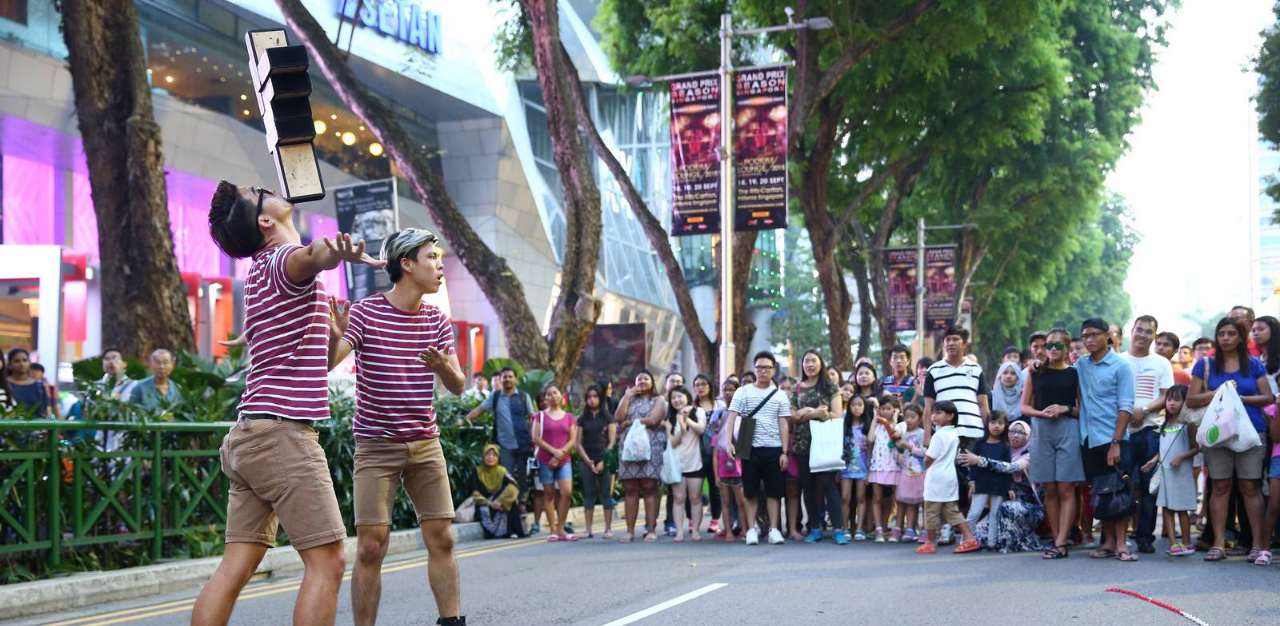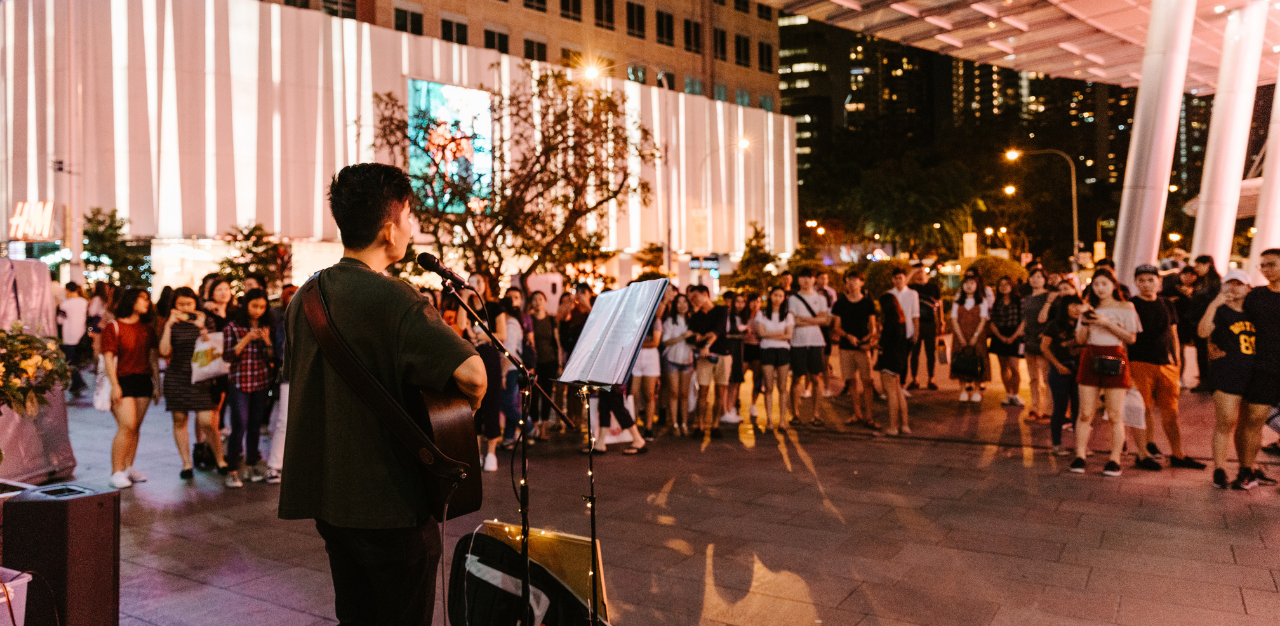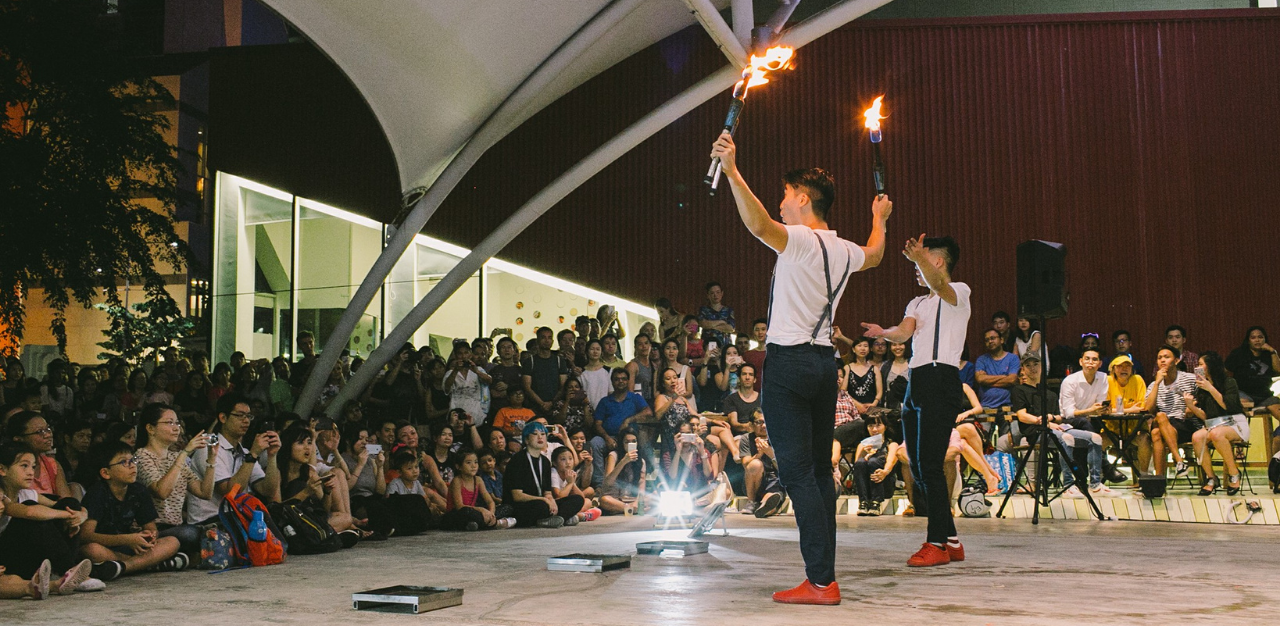Jonathan Goh, 25, is a full-time busker in Singapore, one half of the circus duo The Annoying Brothers, and co-chairman of the Buskers’ Association. He recounts the tumultuous weeks leading up to the circuit breaker: “[I went down to Clarke Quay, tried to start my show, [but] nobody wanted to watch… Usually, I can gather a crowd [of 30 to 40 people] in less than five minutes. But on that day, it was so bad. I picked up my [microphone], talking to myself, but nobody stopped.”
At the time, he had an inkling of what was coming but could not have guessed that the country would enter a state of lockdown the week after. In one fell swoop, his scheduled shows were cancelled, his juggling classes scrapped, and busking was suspended. He was out of a job.
Still, Mr Goh was one of the lucky ones. He already had a Grabfood account and made the switch to food delivery to supplement his income.

The impact on buskers
Financially, buskers in Singapore have been significantly impacted.
Besides delivering food, Mr Goh shares that he was “lucky because [he] had a bit of savings, not a lot but enough to sustain.” While he was able to pay the bills by pivoting to the new job, he had to cut certain expenses , such as subscriptions to various services.
Similarly, the lack of busking opportunities put a huge dent in Jason Yu’s, 25, income. Mr Yu is a full-time artist and musician who started out on the streets. Also studying at a local university, Jason relied on busking to supplement his income.
“A good 50 per cent of my income came from busking.” Jason explains. “Without that, I’ve had to have a tighter budget on my lifestyle and living expenses, [and be] extremely wise with how I spent my money.”
The struggles extend beyond finances too. Flowarts specialist Bryan Wong, 25, had just started his busking career when the pandemic hit. Having looked forward to getting his busking licence, Mr Wong found his plans derailed just two weeks before his auditions.
He has since come to terms with the situation: “Hindsight is 20/20 and looking back now, circuit breaker did give me more time to prepare for the audition which I admittedly needed, but it was frustrating nonetheless.”
“They [buskers] can no longer practise their craft the same way,” explains Salty Xi Jie Ng, 33, an artist and busking advocate who grew close to the community after producing and directing a film on them, titled Singapore Minstrel.
Her fascination with busking stems from the buskers she had watched in her childhood. She recalls, “I would see busking acts as a child and they always mesmerised me…Perhaps it’s being in such a controlled society that makes busking hold that much more magic, because in some way it’s the antithesis of Singapore.”
Ms Ng has also dabbled in busking herself, setting up a typewriter at Ngee Ann City and crafting poems for passersby. This has allowed her to understand the appeal of busking in front of a live audience.
She says, “Practising your craft in front of an audience on the street is a very specific and powerful thing that is both simultaneously work and practice. Practising at home is not the same.”
She shares a conversation she had with busker and friend Roland Chua Kim Seng – who used to strut his dance moves at Tampines: “He was telling me he doesn’t dance that much anymore, because it’s not the same at home.”

Pivoting to digital means
Left without a platform to showcase their craft, some buskers have turned to digital means in order to continue to perform and earn a living. Unfortunately, the digital medium is less than ideal for busking.
Mr Goh points out various challenges with digital busking, such as the lack of organic traffic, the saturated online entertainment landscape, and the inability to actively interact with audiences.
Mr Yu expounds, “Online busking just doesn’t cut it, people aren’t inclined to pay attention (or to tip), and not having a physical element just takes away so much from the performance.”
Mr Wong shares their sentiments: “No online performance can ever replicate the feeling, energy, and vibe that is present in a physical live performance… As soon as we get the chance to, I’d like to see the relevant organisations push to get busking on the streets as fast as possible, and not rely on online live streaming platforms to be a reliable substitute, as online performances will never receive the same amount of love that live performances do.”
The (lack of) measures to support buskers
In December last year, the National Arts Council (NAC) attempted to resume street busking.
It organised a pilot programme at Scape and Clarke Quay over the span of two weeks. Approximately 50 buskers participated, performing in front of a live audience for the first time in over nine months, albeit with stringent safety measures in place.
Regrettably, some measures were not satisfactory.
In ‘Open Letter Re: National Arts Council Management of the Busking Scheme’, Ms Ng shares what she spoke about at a roundtable organised by the Institute of Policy Studies, National Gallery Singapore and Singapore Art Museum on 3 March, during which NAC was present. It includes feedback about the pilot programme, where she relates how some buskers were incorrectly told that the cashless mode of payment was compulsory when in fact it was not mandatory.
“QR codes printed were small and affected takings, as well as resulted in audiences having to go closer to scan the codes, defeating the purpose of Safe Management Measures, such as fence poles that made buskers feel caged.”

Further, Ms Ng highlights, “Full-time buskers were not prioritised as those invited to be part of the pilot when they are most in need of busking income during the pandemic…They are…those from whom the pilot could have gained the most pragmatic feedback; they could have been the best resource towards a real study on how to resume busking.”
She adds, “The Buskers’ Association Singapore was eager and ready to lend advice and help, but were not consulted by NAC for the pilot. They were only approached when temperature takers were needed at short notice.”
Since the pilot, the buskers TheHomeGround interviewed have reported radio silence from the authorities. With no updates from the authorities on when busking will be allowed, the buskers have again been left in a state of limbo, as they have been for more than a year.
A community asking to be remembered
While the busking community is eager for the resumption of street busking, they are not ignorant of the times they live in.
Yeo Ying Hao, 32, co-chairman and freelance busker with Chinese pop band Afterworkers acknowledges, “The reality is that there are bigger issues than busking when it comes to the pandemic, so we’re not going to say, ‘Okay, forget public health, we need to be on the streets.’”
Instead, he has one simple request: “When things do reopen, we want to be there with everyone. We do not want to be a disadvantaged group in reopening conversations.”
Mr Goh highlights, “I think communication can be improved between the NAC and the buskers, where they could at least put an announcement monthly.”
He questions, “They always use the words ‘gradual resumption’, so if there’s one pilot happening already, there should be more pilots happening for gradual resumption. [But] there have been no pilots happening after three months, then what is a gradual resumption?”
“I think I speak for all buskers when I say we just want the relevant arts organisations to recognise our struggles and be sincere in helping us,” Mr Yu emphasises.
Nevertheless, there is not much buskers in Singapore can do now except wait.
Even so, Ms Ng conveys her love for the community. “You are not forgotten,” she says.
To that end, Mr Yeo has a few words of encouragement: “Just hang in there a little longer. It seems like we are reopening soon. It seems like help is on the way… it’s time to really start practising and getting back into shape. And when the streets reopen, I would like to see all of them in their full glory.”
Join the conversations on THG’s Facebook and Instagram, and get the latest updates via Telegram.




























